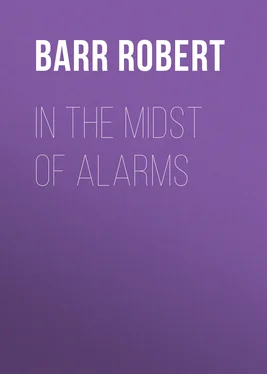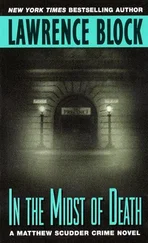Robert Barr - In the Midst of Alarms
Здесь есть возможность читать онлайн «Robert Barr - In the Midst of Alarms» — ознакомительный отрывок электронной книги совершенно бесплатно, а после прочтения отрывка купить полную версию. В некоторых случаях можно слушать аудио, скачать через торрент в формате fb2 и присутствует краткое содержание. Жанр: foreign_prose, foreign_antique, на английском языке. Описание произведения, (предисловие) а так же отзывы посетителей доступны на портале библиотеки ЛибКат.
- Название:In the Midst of Alarms
- Автор:
- Жанр:
- Год:неизвестен
- ISBN:нет данных
- Рейтинг книги:4 / 5. Голосов: 1
-
Избранное:Добавить в избранное
- Отзывы:
-
Ваша оценка:
- 80
- 1
- 2
- 3
- 4
- 5
In the Midst of Alarms: краткое содержание, описание и аннотация
Предлагаем к чтению аннотацию, описание, краткое содержание или предисловие (зависит от того, что написал сам автор книги «In the Midst of Alarms»). Если вы не нашли необходимую информацию о книге — напишите в комментариях, мы постараемся отыскать её.
In the Midst of Alarms — читать онлайн ознакомительный отрывок
Ниже представлен текст книги, разбитый по страницам. Система сохранения места последней прочитанной страницы, позволяет с удобством читать онлайн бесплатно книгу «In the Midst of Alarms», без необходимости каждый раз заново искать на чём Вы остановились. Поставьте закладку, и сможете в любой момент перейти на страницу, на которой закончили чтение.
Интервал:
Закладка:
Bartlett’s lowering countenance indicated resentment at the imputation, but he neither affirmed nor denied. Yates strolled out of the barn, while the farmer went through a small doorway that led to the stable. A moment later he heard Hiram calling loudly to his son to bring the pails and water the horses.
“Evidently preparing an alibi ,” said Yates, smiling to himself, as he sauntered toward the gate.
CHAPTER V
“What’s up? what’s up?” cried Yates drowsily next morning, as a prolonged hammering at his door awakened him.
“Well, you’re not, anyhow.” He recognized the voice of young Hiram. “I say, breakfast’s ready. The professor has been up an hour.”
“All right; I’ll be down shortly,” said Yates, yawning, adding to himself: “Hang the professor!” The sun was streaming in through the east window, but Yates never before remembered seeing it such a short distance above the horizon in the morning. He pulled his watch from the pocket of his vest, hanging on the bedpost. It was not yet seven o’clock. He placed it to his ear, thinking it had stopped, but found himself mistaken.
“What an unearthly hour,” he said, unable to check the yawns. Yates’ years on a morning newspaper had made seven o’clock something like midnight to him. He had been unable to sleep until after two o’clock, his usual time of turning in, and now this rude wakening seemed thoughtless cruelty. However, he dressed, and yawned himself downstairs.
They were all seated at breakfast when Yates entered the apartment, which was at once dining room and parlor.
“Waiting for you,” said young Hiram humorously, that being one of a set of jokes which suited various occasions. Yates took his place near Miss Kitty, who looked as fresh and radiant as a spirit of the morning.
“I hope I haven’t kept you waiting long.” he said.
“No fear,” cried Mrs. Bartlett. “If breakfast’s a minute later than seven o’clock, we soon hear of it from the men-folks. They get precious hungry by that time.”
“By that time?” echoed Yates. “Then do they get up before seven?”
“Laws! what a farmer you would make, Mr. Yates!” exclaimed Mrs. Bartlett, laughing.
“Why, everything’s done about the house and barn; horses fed, cows milked—everything. There never was a better motto made than the one you learned when you were a boy, and like as not have forgotten all about:
“‘Early to bed and early to rise
Makes a man healthy, wealthy, and wise.’
I’m sorry you don’t believe in it, Mr. Yates.”
“Oh, that’s all right,” said Yates with some loftiness; “but I’d like to see a man get out a morning paper on such a basis. I’m healthy enough, quite as wealthy as the professor here, and everyone will admit that I’m wiser than he is; yet I never go to bed until after two o’clock, and rarely wake before noon.”
Kitty laughed at this, and young Hiram looked admiringly at the New Yorker, wishing he was as clever.
“For the land’s sake!” cried Mrs. Bartlett, with true feminine profanity, “What do you do up so late as that?”
“Writing, writing,” said Yates airily; “articles that make dynasties tremble next morning, and which call forth apologies or libel suits afterward, as the case may be.”
Young Hiram had no patience with one’s profession as a topic of conversation. The tent and its future position was the burning question with him. He mumbled something about Yates having slept late in order to avoid the hearing of the words of thankfulness at the beginning of the meal. What his parents caught of this remark should have shown them how evil communications corrupt good manners; for, big as he was, the boy had never before ventured even to hint at ridicule on such a subject. He was darkly frowned upon by his silent father, and sharply reprimanded by his voluble mother. Kitty apparently thought it rather funny, and would like to have laughed. As it was, she contented herself with a sly glance at Yates, who, incredible as it may seem, actually blushed at young Hiram’s allusion to the confusing incident of the day before.
The professor, who was a kind-hearted man, drew a herring across the scent.
“Mr. Bartlett has been good enough,” said he, changing the subject, “to say we may camp in the woods at the back of the farm. I have been out there this morning, and it certainly is a lovely spot.”
“We’re awfully obliged, Mr. Bartlett,” said Yates. “Of course Renmark went out there merely to show the difference between the ant and the butterfly. You’ll find out what a humbug he is by and by, Mrs. Bartlett. He looks honest; but you wait.”
“I know just the spot for the tent,” cried young Hiram—“down in the hollow by the creek. Then you won’t need to haul water.”
“Yes, and catch their deaths of fever and ague,” said Mrs. Bartlett. Malaria had not then been invented. “Take my advice, and put your tent—if you will put it up at all—on the highest ground you can find. Hauling water won’t hurt you.”
“I agree with you, Mrs. Bartlett. It shall be so. My friend uses no water—you ought to have seen his bill at the Buffalo hotel. I have it somewhere, and am going to pin it up on the outside of the tent as a warning to the youth of this neighborhood—and what water I need I can easily carry up from the creek.”
The professor did not defend himself, and Mrs. Bartlett evidently took a large discount from all that Yates said. She was a shrewd woman.
After breakfast the men went out to the barn. The horses were hitched to the wagon, which still contained the tent and fittings. Young Hiram threw an ax and a spade among the canvas folds, mounted to his place, and drove up the lane leading to the forest, followed by Yates and Renmark on foot, leaving the farmer in his barnyard with a cheery good-by, which he did not see fit to return.
First, a field of wheat; next, an expanse of waving hay that soon would be ready for the scythe; then, a pasture field, in which some young horses galloped to the fence, gazing for a moment at the harnessed horses, whinnying sympathetically, off the next with flying heels wildly flung in the air, rejoicing in their own contrast of liberty, standing at the farther corner and snorting defiance to all the world; last, the cool shade of the woods into which the lane ran, losing its identity as a wagon road in diverging cow paths. Young Hiram knew the locality well, and drove direct to an ideal place for camping. Yates was enchanted. He included all that section of the country in a sweeping wave of his hand, and burst forth:
“‘This is the spot, the center of the grove:
There stands the oak, the monarch of the wood.
In such a place as this, at such an hour,
We’ll raise a tent to ward off sun and shower.’
Shakespeare improved.”
“I think you are mistaken,” said Renmark.
“Not a bit it. Couldn’t be a better camping ground.”
“Yes; I know that. I picked it out two hours ago. But you were wrong in your quotation. It is not by Shakespeare and yourself, as you seem to think.”
“Isn’t it? Some other fellow, eh? Well, if Shake is satisfied, I am. Do you know, Renny, I calculate that, line for line, I’ve written about ten times as much as Shakespeare. Do the literati recognize that fact? Not a bit of it. This is an ungrateful world, Stilly.”
“It is, Dick. Now, what are you going to do toward putting up the tent?”
“Everything, my boy, everything. I know more about putting up tents than you do about science, or whatever you teach. Now, Hiram, my boy, you cut me some stakes about two feet long—stout ones. Here, professor, throw off that coat and négligé manner, and grasp this spade. I want some trenches dug.”
Читать дальшеИнтервал:
Закладка:
Похожие книги на «In the Midst of Alarms»
Представляем Вашему вниманию похожие книги на «In the Midst of Alarms» списком для выбора. Мы отобрали схожую по названию и смыслу литературу в надежде предоставить читателям больше вариантов отыскать новые, интересные, ещё непрочитанные произведения.
Обсуждение, отзывы о книге «In the Midst of Alarms» и просто собственные мнения читателей. Оставьте ваши комментарии, напишите, что Вы думаете о произведении, его смысле или главных героях. Укажите что конкретно понравилось, а что нет, и почему Вы так считаете.












